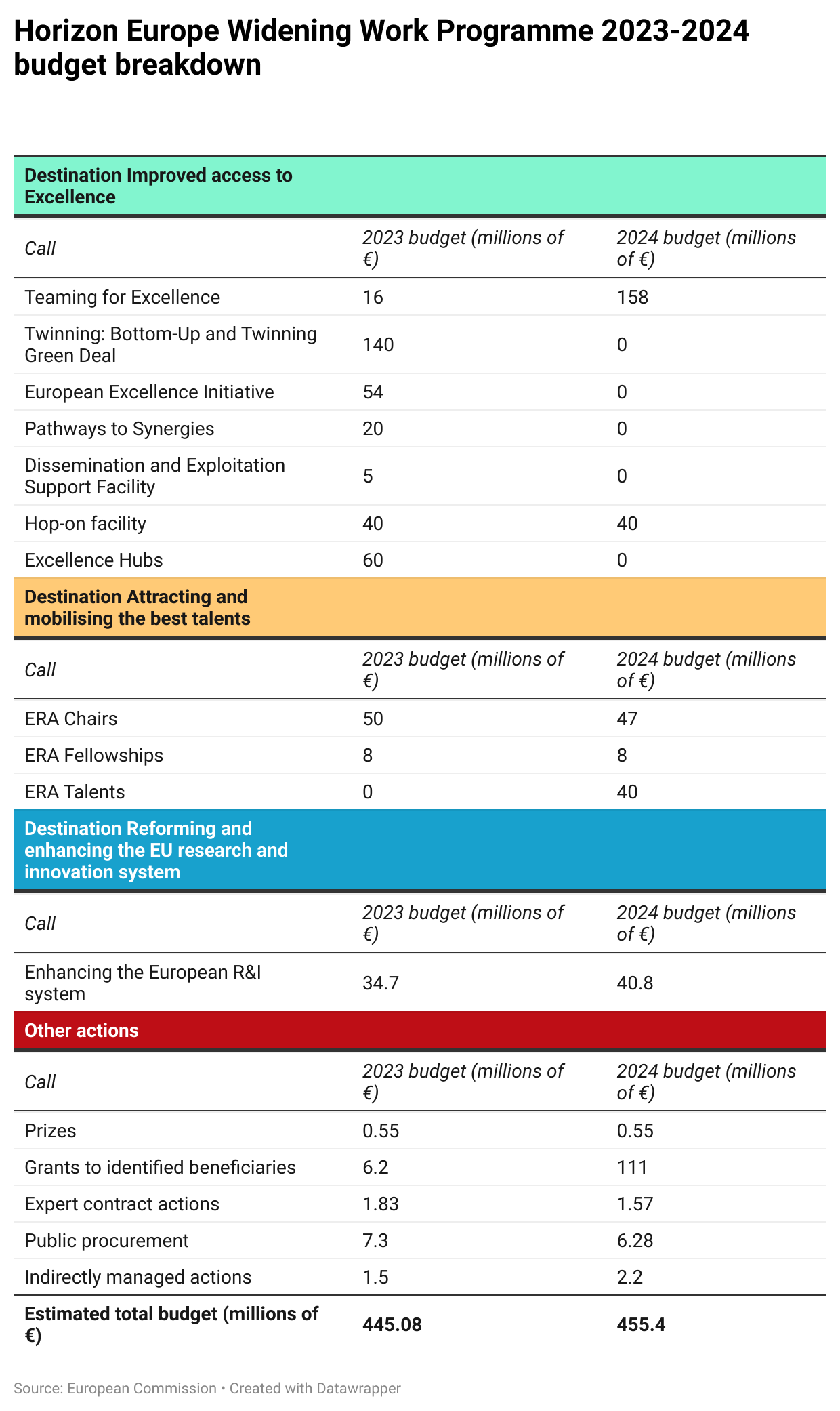There are two new calls in the €900M plan that aims to reduce the innovation gap in Europe

The European Commission’s finalised Widening work programme for 2023/24, which is dedicated to closing the innovation gap between leading and lagging EU countries, has now been published as part of a wider release of Horizon Europe work programmes.
Its budget of just over €900 million is below the previous two-year €934.55 million programme.
The goal of the Widening participation and strengthening the European Research Area work programme is to improve Europe’s overall research and innovation landscape by improving countries and regions performing below the EU 27 average.
These are: Bulgaria, Croatia, Cyprus, Czechia, Estonia, Greece, Hungary, Latvia, Lithuania, Malta, Poland, Portugal, Romania, Slovakia and Slovenia.
Their average success rate in getting money from Horizon Europe is around 13.6%, lower than the EU average of 14.2%. They are also in general the countries that spend the least on research and development as a percentage of GDP, and perform worse in winning Horizon Europe grants.
Institutional reform
The key objectives of the new work programme remain similar to the first two years: institutional reform, improving skills, winning more Horizon Europe grants, increasing brain circulation and reducing brain drain.
To accomplish this are calls in teaming, twinning and ERA chairs. Teaming provides co-funding for the establishment or upgrade of R&I centres of excellence; twinning is about networking and raising the profile of research institutes in Widening countries by pairing them with leading institutes elsewhere; ERA chairs is a programme that brings high level researchers or managers to Widening countries.
There are two new calls in the 2023/24 work programme: pathways to synergies and dissemination and exploitation support facility.
The first will improve synergies between Horizon Europe funding and other funds, such as the European Regional Development Fund and the Recovery and Resilience Facility. Around 20 projects are expected to be funded under this call, which has a budget of €20 million.
The second new call, which has a budget of €5 million, is intended to improve research dissemination and exploitation capacities in Widening countries.
The Western Balkans twinning call that received €21 million in 2021 is not included in the new 2023/24 work programme as it was a one-off.
The work programme also sets out commitments to deepen the European Research Area, following the adoption in 2021 of new ERA policy agenda.
This lists 20 objectives, including better enabling open science, promoting attractive research careers, strengthening research infrastructures and bringing science closer to citizens.
This is the first time a Widening work programme has been created from scratch following the adoption of this new policy agenda, meaning there are references to it scattered throughout with the calls reflecting at least one of the 20 objectives.
See below our budget breakdown of the 2023/24 Widening work programme.

Work to be done on the Widening
The Widening programme was first introduced under the Horizon 2020 framework but its budget was tripled under Horizon Europe, with 3.3% of the overall €95.5 billion dedicated to it. This budget increase has raised expectations for its results, with the European Commissioner for research Mariya Gabriel telling a Science|Business conference in November that “tripling the Widening budget means tripling opportunities for scientists”.
There is little doubt that Widening actions can have a positive impact, but a report by the European Court of Auditors published this year found that their success also depends on the individual countries increasing their research budgets and introducing national policies.
It looked at the impact of Widening actions under the EU’s previous framework programme, Horizon 2020, and found that it was “uneven”, with four countries winning 60% of all funds.
The auditors also called on the Commission to monitor the efficiency of funding schemes.
Member states responded to this report and said that the Commission should identify indicators of the impact of Widening schemes on participation in other, more competitive parts of Horizon Europe.
Maia Liisa Anton, head of research administration at TalTech, Tallinn University of Technology, previously told Science|Business that the main goal of the Widening programme should be that it becomes obsolete, meaning all EU countries build the capacity to compete in all Horizon Europe calls, without needing specialised schemes.
Meanwhile, Ivars Ijabs, a MEP from Latvia, one of the countries that dedicates the least national funding to R&D, acknowledged the fact that EU member states like his home country have been “neglecting” research and innovation investments for over 20 years.
He said, though, that several eastern European countries have made commitments to raise R&D investment. The Latvian government is aiming to bring it up to 1.5% of the GDP – it currently stands at under 1%.
In terms of Widening actions, he said that longer-running calls like twinning, teaming, ERA chairs, are working well, but newer initiatives like the hop-on facility – which allows already established research consortia to add a member from a Widening country to a funded project when normally they could not – are more complicated.
“For administrative issues, it’s not clear for research institutions how they could use that opportunity,” Ijabs said.





 A unique international forum for public research organisations and companies to connect their external engagement with strategic interests around their R&D system.
A unique international forum for public research organisations and companies to connect their external engagement with strategic interests around their R&D system.